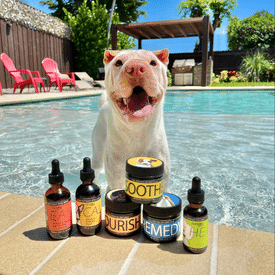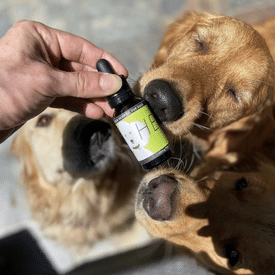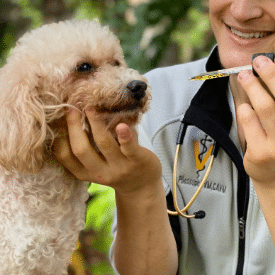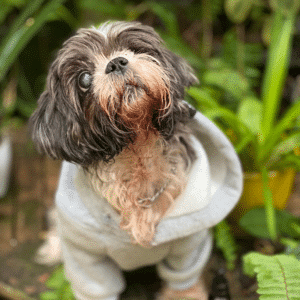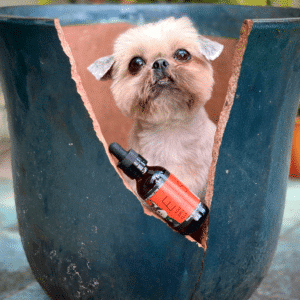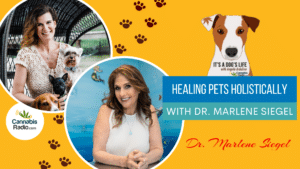Is Lavender Essential Oil Safe for Pets?

Have you noticed that everywhere you look, people are talking about essential oils? What used to be considered just a fringe treatment or a pleasant way to wade into aromatherapy has become part of the American mainstream. The same essential oil trend has extended to the world of pet products, and honestly, I couldn’t be happier.
When it comes to Lavender Essential Oil for dogs and cats, this powerful plant oil delivers a natural solution for many pet health concerns as an alternative to using otherwise harmful synthetic products or medications with adverse reactions or side effects for our pets.
Table of Contents
What is Lavender Essential Oil?
Lavender essential oil is a highly concentrated extract, derived from lavender plants. Lavender has been used for its properties as an analgesic, sedative, anti-inflammatory, antihistamine, and antitumoral.
Lavender oil is commonly used in fragrances, aromatherapy, and skin care formulas. The Egyptians and Romans used lavender for bathing, relaxing, cooking, and as a scent in ancient times. People have recently begun to utilize it for a broader range of reasons, including relaxation and calming anxiety. Its tranquil and relaxing fragrance provides a calm environment ideal for sleep, and when taken internally, it can help to relieve tension.
It’s been studied extensively in animals and it is safe to use on all species. Lavender essential oil can be applied topically, given internally, or diffused.
Is Lavender Oil Safe for Dogs?
When it comes to our dogs, there is a lot of debate and disinformation online regarding the risks of essential oils. While certain essential oils are potentially hazardous to small animals, the vast majority of reports of adverse reactions are due to synthetic or adulterated oils.
Unfortunately, many products being marketed to consumers as lavender essential oil are, in truth, not actual lavender at all. This popular scent is one of the most adulterated and synthetically altered essential oils on the market.
Some sly manufacturers even incorporate the word pure or organic into the actual product name in the hopes that consumers will believe that these are actual claims as to the product’s purity. Because the industry is currently unregulated, this is a purchase where it really pays off to do your research and make an educated choice.
Use only therapeutic or medical-grade essential oils if you’re looking for lavender essential oil for dogs. This suggests that you should avoid buying oils from Amazon, your local supermarket, or any other business that doesn’t offer test results. For essential oils, a respectable provider will have a certificate of analysis, particularly a GCMS test.
Most essential oils are safe for dogs, including Lavender essential oil, as long as you’re using only therapeutic or medical grade essential oils with a GCMS test, are properly diluting the oil, and are following the recommended therapeutic applications.
With those precautions in place, dogs can safely inhale and ingest lavender, however, you should make sure to start them on low doses to gauge their reaction. Remember that any time you start your pet on a new health regimen, you should monitor them closely for changes and contact your veterinarian if you notice adverse reactions.
Is Lavender Essential Oil Safe for Cats?
Despite widespread misconception about essential oils’ toxicity in cats, many essential oils are indeed safe and beneficial for cats. Yet again, as long as you utilize only therapeutic or medical grade essential oils that have undergone a GCMS test, dilute the oil accordingly, and follow the suggested therapeutic uses, you can safely use most essential oils with your cat.
Dr. Melissa Shelton, DVM, is an internationally recognized holistic veterinarian who specializes in using medical-grade essential oils for complete and natural care of all animals – including dogs, horses, birds, and yes, cats. She has authored four books on the subject and has taught courses in essential oils in locations across the United States, Canada, Australia, and Japan. Dr. Shelton is regarded as the leading expert in the use of essential oils with all animals – from insects to elephants.
In an excerpt from her article, The Science Behind Cats and Essential Oils, Dr. Shelton provides some clarification on the viral social media posts you may have seen regarding cats and essential oil use.
“Where did our misconception about cats come from? One main research article that is used to support that phenols are toxic to cats is from 1972. This is very, very old in the medical field. And if one reads further into the research, it has nothing to do with natural essential oils, and everything to do with benzyl alcohol being injected, added to meat products as a preservative, or used as a bacteriostatic in drug or biological products. Sure, if you only read the headline “Toxicosis in cats from the use of benzyl alcohol in lactated Ringer’s solution” in the Journal of American Veterinary Medical Association in 1983, you may worry also about the use of any phenol. However, we really need to evaluate apples to apples. If you knew nothing of veterinary medicine, feline physiology, or the vast difference between a chemical benzene ring and a natural substance containing a benzene ring, you would err on the side of caution. Which seems to be the case for most of the aromatherapy world at this time.”
“And sadly, more current information is out there. Even in the November 1984 edition of Veterinary Clinics of North America: Small Animal Practice – Vol. 14, No. 6; titled Symposium on Advances in Feline Medicine II, there is an incredibly profound statement by Jeff R. Wilcke DVM, MS. “Even drugs known for toxicity in cats can be used safely if we are aware of and compensate for certain peculiarities.” That basically says it all. And that is 1984! Here we are – some 33 years later, still questioning if essential oils are killing cats, and reporting all over the place that it is a huge area of concern. Cats would be dropping over dead all over the world if essential oils were truly as toxic as those reports imply. With the amazing amount of essential oil use in households containing all sorts of animals, I am impressed at the level of safety actually witnessed. Just like with the phenol research, it will matter what quality of essential oil is used. I do not think that synthetics or altered essential oils should be in the same category at all with true and natural essential oils.”
“Essential oils need to be regarded similarly to how we use drugs. There are species considerations, dosing considerations, and interval considerations. This is normal.” says Dr. Shelton. Lavender essential oil for cats, like most essential oils, can be safely used with cats, provided you take the necessary precautions. You should, however, start them on minimal dosages to assess their reaction. Keep in mind that whenever you put your pet on a new health regimen, you should keep a careful eye on them for any changes and call your veterinarian if you observe any negative reactions.
Risks of Essential Oils for Dogs and Cats
One thing to remember about essential oils is that they are incredibly potent. An essential oil has a potency of 50-70 times that of a plant. This indicates that it has the potential to be harmful, particularly to small animals.
If essential oils are to be diffused or used topically, they must be adequately diluted. Because pets have millions more olfactory receptors than people, they are more sensitive to strong odors, therefore adequate dilution is critical. Also, keep in mind that the smaller the pet, the more you should dilute it.
When using essential oils for your pet, the most common adverse effect is skin irritation. Most of these responses, however, subside within 24-48 hours with dilution and fresh air. In any event, extreme caution should be exercised while using essential oils around animals who are young, pregnant, nursing, or on certain medications.
Lavender Essential Oil Benefits
When you think of lavender, you probably picture the beautiful purple plant, Lavandula angustifolia. The lavender plant can be incredibly beneficial to your garden. In fact, lavender plants have been proven to safely ward off pesky mosquitos while not damaging the environment for bee populations and other helpful pollinators in your area.
Like the plant itself, the lavender essential oil has so many benefits for dogs, cats, and even horses as well.

Lavender oil is commonly used to relieve itching, irritation, and inflammation in dogs. Lavender essential oil is also indicated for skin conditions, fungal infections, muscular issues, high blood pressure, cardiac issues, insomnia, and of course, for its calming effects.
Lavender can also:
- Reduce inflammation in both joints and wounds
- Provide relief for itchy or irritated skin
- Be used as a wound wash to take the sting out of bites and burns
- Create a feeling of calm when ingested orally OR when used in aromatherapy
- Ward off fleas, ticks, mosquitos, and other pesky bugs
- Fight germs and promote healing
- Help other plant oils to be more effective
Because lavender helps other plant oils to be more effective, it has also been found to boost the benefits of CBD oil for pets. This is why CBD Dog Health’s CALM: CBD oil for dogs, CALM: CBD Oil for Cats and CALM: CBD oil for horses, contains full-spectrum hemp CBD as well as a blend of lavender essential oil, to help dogs and cats remain calm during triggering events like storms, fireworks, and during normal bouts of stress, fear and anxiety.

How To Give Your Pet Lavender Oil
As when using essential oils on people, you should always dilute the oils before using them. Dr. Janet Roark, known as the Essential Oil Vet, recommends using a water-based diffuser on an intermittent setting and using only 3-4 drops in your diffuser. Additionally, make sure the door to the room with the diffuser remains open at all times so that pets may easily leave if they are uncomfortable.
Some other ways to start using Lavender Essential Oil for pets:
- CBD Dog Health’s CALM: CBD oil for dogs, cats and horses
- Start with just a few drops of lavender EO added to your pet’s water or food per day
- Add lavender to your diffuser to calm everyone in the house
- Massage a drop of lavender into your pet’s fur
- Brew your dog a lavender tea with fresh lavender leaves in order to achieve a calming effect.
- To combat fleas, make your own safe repellent by adding five drops each of citronella oil, rosemary oil, peppermint oil, and eucalyptus oil to one cup of water. Shake it up and put it in a spray bottle.
Related: Pet Safe Essential Oils with Dr. Janet Roark
Signs of Lavender Essential Oil Toxicity in Dogs and Cats
Always start with very small doses of diluted lavender oil and gradually increase to avoid any adverse responses in your pet. Keep a close eye on your pet’s reactions and in the case of an adverse reaction, make sure to move your pet away from any diffusers, bathe your pet if the oil was applied topically, and take your pet to the vet if they show any indications of a negative reaction to the lavender oil.
Some symptoms of lavender toxicity in cats and dogs can include:
- Excessive Drooling
- Gastrointestinal symptoms, such as vomiting or diarrhea
- Lethargy
- Refusing to Eat
- Neurological symptoms, such as staggering or shaking
- Decreased respiratory rate, asthma, or aspiration pneumonia
- Changes to heart rate
- Liver failure
Consider Your Pet’s Overall Environment
It’s important to also think about how your pet interacts with their environment; because our pets are constantly close to the ground, they actually inhale and ingest items from our flooring, so avoid using the following household products:
- Synthetic air fresheners, plug-ins, and scented candles
- Floor and carpet cleaners that contain harsh chemicals or synthetic fragrances
- Laundry detergent with artificial fragrances and chemicals
- Scented fabric softeners and dryer sheets
They spend most of their lives lying on our floors, rugs, beds, blankets, pillows, and furniture, so consider how these items are washed, laundered, and treated. Part of safely using essential oils for your pet is to also eliminate other toxins that your pet may be exposed to.
Related: Essential Oils for Dogs 101

